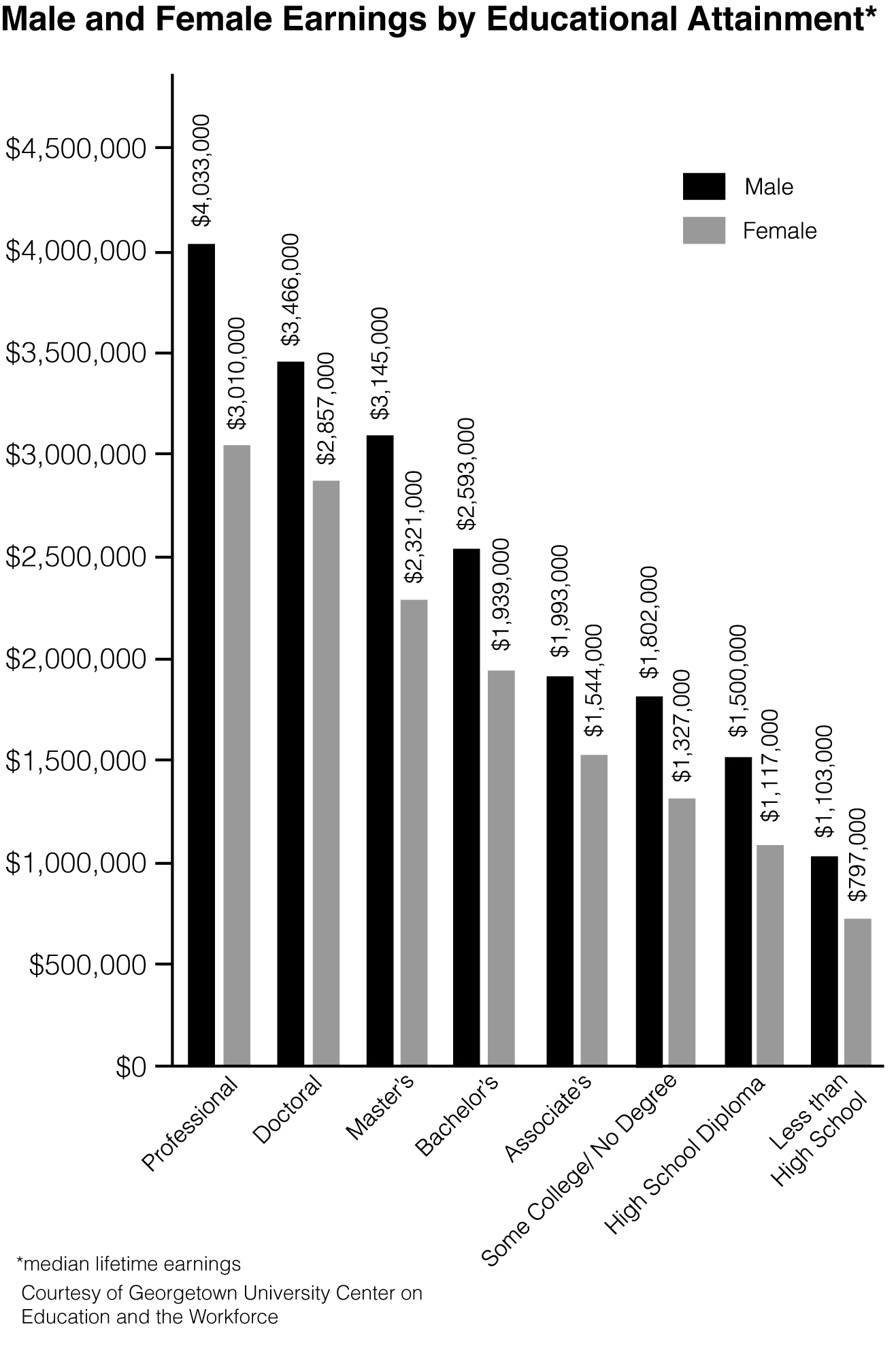According to a Georgetown University study, there is still a need for feminism, as shown by the wage gap between men and women.
Women may have come a long way, but now that the tide of the mainstream feminist movement recedes, women are left with the sands of complacency and the false idea that true gender equality has already been achieved.
Georgetown University released a study last month largely discrediting the idea that women and men have achieved equality in the workplace.
The study, “The College Payoff,” used census data to investigate average lifetime earnings based on levels of education, gender and race. The discrepancies that researchers uncovered were harrowing.

According to the study, on average, women earn 25 percent less than men throughout their lifetimes, even when they have achieved equal levels of education. In fact, the report indicated that a typical woman has to have a Ph.D. to make as much money as a male with a bachelor’s degree.
This does not mean that women have given up on education. In fact, quite the opposite is true. The U.S Department of Commerce projects that by 2019 women will make up 60 percent of undergraduate college enrollment.
So why the discrepancy? Why do more women seek higher levels of education, and yet still find themselves earning less than their male counterparts?
According to Dr. Siobhan King, a women’s studies undergraduate advisor and professor, the answer isn’t simple.
“Part of it is the educational system, in which women are socialized into the ‘feeling industry,’ which includes jobs such as preschool teachers and social workers,” King said. “And these jobs, of course, tend not to be as profitable as those in which men are socialized into.”
This sort of institutionalized sexism is only a piece of the varying wage puzzle. Georgetown also compared average salaries amongst men and women with the same level of education in similar fields and positions and found that men are still earning more money. In fact, the study computed a 61.1 percent gender-earning gap amongst financial managers alone.
This statistic illustrates one of the areas in which women are often still bumping up against the glass ceiling – the business world.
“Women are often not taught to be aggressive or to negotiate,” King said. “Women need to learn these skills if they want to be more successful in the business world.”
Yet strong negotiating skills are not necessarily the only thing holding women back.
Finance major Nakeeda Earle said she feels socially excluded in classes, where most of her professors are males.
“After class is over the male students and male professors have a special camaraderie,” Earle said. “There is fist-pounding and talking and I can’t really fit in there. Men react differently to women.”
Despite all of this, sociology professor Dr. Julia Ericksen, is sure to remind students just how far women have come.
“When I first came here, the men gave me a hard time,” Ericksen said. “One professor even came to me and asked if I could sew and fix his zip. It made me think, ‘Am I your colleague or your zip-fixer?’”
It is certainly not that way anymore, but according to Ericksen there is still one major problem barring women from earning as much money as men.
“Until women fix the home and family problem they will never achieve true equality,” Ericksen said. “Young women today don’t think that having children and raising a family will effect their careers. I don’t know what planet they’re living on, but it certainly isn’t this one.”
Many businesses use the time that women take off from work for childbirth and child-rearing as an excuse not to give them the promotions that many of them deserve.
“They are expected to be supermom,
have a career and look good while they are doing it all,” Ericksen said.
Although roles in the home are certainly growing closer to equality, they are not there yet, which acts as a detriment to many women’s careers. In turn, this inequality in the workplace can harm U.S. society as a whole.
“When women make less money than men it is easy for a hierarchy to develop, with working class mothers finding themselves at the bottom,” King said. “They are expected to support their families but often aren’t paid well enough to do so.”
“Women have to have a feminist consciousness,” Ericksen added. “They can’t assume that their personal lives will fix themselves, and they have to be willing to negotiate. They have to learn how to find a better balance at home before they can achieve it in the workplace.”
Amy Stansbury can be reached at amy.stansbury@temple.edu.


This is called Zombie Feminism, the movement is dead, there is nothing left to complain about, women have more rights than they ever deserved and most of them at the expense of men but we have these feminist wandering around like brain dead Zombies repeating the same lies over and over about how they don’t get paid more money to do less work than men. If these women think they are so underpaid then they should have no problem starting their own business and paying themselves as much as they like out their own productivity.
Proof of this Zombie Feminism is the fact that more women are openly coming out against feminism, such as this woman’s channel on YouTube:
http://www.youtube.com/user/WomanAgainstFeminism